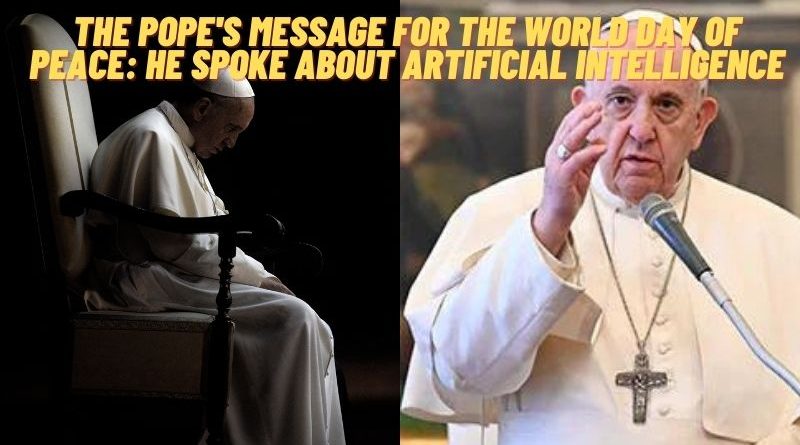THE POPE’S MESSAGE FOR THE WORLD DAY OF PEACE: HE SPOKE ABOUT ARTIFICIAL INTELLIGENCE
The World Day of Peace is celebrated on January 1, 2024 with the theme “Artificial Intelligence and Peace”, on that occasion Pope Francis sent a message translated by the Informative Catholic Agency:
Artificial intelligence and peace
At the beginning of the new year, a time of grace that the Lord bestows on each of us, I want to address the people of God, nations, heads of state and government, representatives of different religions and civil society, and all the men and women of our time, in order to send them my best wishes for peace.ADVERTISING
1. The progress of science and technology as a path to peace
The Holy Scripture testifies that God gave his Spirit to people in order to give them “skill, ability and understanding in all matters” ( Ex. 35, 31). Intelligence is an expression of dignity with which the Creator has endowed us, who created us in his image and likeness (cf. Genesis 1:26) and trained us to respond to his love with freedom and knowledge. Science and technology demonstrate this fundamentally relational nature of human intelligence in a special way: they are the extraordinary fruit of its creative potential.
In the Pastoral Constitution Gaudium et Spes, the Second Vatican Council confirmed this truth by declaring: “Through his work and the strength of his spirit, man has always sought to develop his life as widely as possible” [1]. When people strive “with the help of technical skills” to make the Earth “a worthy abode for the entire human family” [2], they act according to God’s plan and cooperate with his will to complete the work of creation and spread peace among nations. And the progress of science and technology, to the extent that it contributes to the better organization of human society, the growth and development of freedom and fraternal unity, leads, therefore, to the betterment of man and the transformation of the world.
We rightly rejoice and are grateful for the extraordinary achievements of science and technology, thanks to which countless evils that plagued human life and caused great suffering have been overcome. At the same time, scientific and technological progress, which enables unprecedented control over reality, puts a multitude of possibilities in people’s hands, some of which may pose a threat to human survival and a danger to the common home [3].
Significant advances in new information technologies, especially in the digital field, therefore bring amazing opportunities and serious dangers, with serious implications for the pursuit of justice and harmony among nations. That is why it is very necessary to ask some urgent questions. What will be the consequences of new digital technologies in the medium and long term? And what impact will they have on the lives of individuals and society, on international stability and peace?
2. The future of artificial intelligence between promise and risk
The advances achieved in information technology and the development of digital technologies in the past decades have already led to profound changes in global society and its dynamics. New digital tools are changing the face of communication, public administration, education, consumption, personal interactions and countless other aspects of everyday life.
Furthermore, with the help of technologies that use a handful of algorithms, it is possible to extract data from the digital traces left on the Internet that enable the control of people’s thinking and habits in relationships, often without their knowledge, for commercial or political purposes, thereby limiting their conscious freedom of choice. In an Internet space overloaded with information, they can shape the flow of data according to selection criteria that the user does not always notice.
We must remember that scientific research and technological innovation are not separated from reality and “neutral” [4], but are subject to cultural influences. As it is a question of completely human activities, the directions they take reflect the choices conditioned by the personal, social and cultural values of each era. The same applies to the results they achieve: precisely because they are the fruit of a specific human approach to the world around us, they always have an ethical dimension, closely related to the decisions of those who conduct experiments and direct production towards certain goals.
This also applies to forms of artificial intelligence. In the world of science and technology, there is still no single definition for it. The term itself, which has already entered everyday use, encompasses a series of knowledge, theories and techniques aimed at achieving that machines, in their work, reproduce or imitate the cognitive abilities of people. To speak in the plural of “forms of intelligence” may above all help to emphasize the unbridgeable gap that exists between these systems, however incredible and powerful they may be, and human persons: they are, ultimately, “fragmentary”, in the sense that they can only imitate or reproduce some functions of human intelligence. The use of the plural also emphasizes that these devices, which are very different from each other, should always be viewed as “sociotechnical systems”. Namely, their effect, regardless of the underlying technology, depends not only on the way they are made, but also on the goals and interests of those who own them and those who develop them, and on the situations in which they are used.

Artificial intelligence should therefore be understood as a separate world made up of different realities, so we cannot a priori assume that its development will make a positive contribution to the future of humanity and peace among nations. Such a positive outcome will be possible only if we prove ourselves capable of behaving responsibly and respecting fundamental human values such as “inclusivity, transparency, security, justice, confidentiality and reliability” [5].
It is also not enough to assume that those who develop algorithms and digital technologies will behave ethically and responsibly. It is necessary to strengthen or, if necessary, establish bodies responsible for considering new ethical issues and protecting the rights of those who use some form of artificial intelligence or are exposed to their influence [6].
The enormous spread of technology must therefore be accompanied by adequate construction to take responsibility for its development. Freedom and peaceful coexistence are threatened when people succumb to the temptation of egoism, self-interest, the desire for profit and the desire for power. We therefore have a duty to broaden our view and direct technological and scientific research towards the aspiration to achieve peace and the common good, in the service of the integral development of man and community [7].
The inalienable dignity of every human being and the brotherhood that binds us as members of one human family must be at the basis of the development of new technologies and serve as an indisputable criterion for their evaluation before they are put into use, so that digital progress is realized in the spirit of justice and contributes to peace . Technological developments that do not lead to an improvement in the quality of life of all humanity, but on the contrary worsen inequalities and conflicts, cannot be considered real progress [8].
Artificial intelligence will become increasingly important. The challenges it presents to us are technical, but also anthropological, didactic, social and political. It promises, for example, effort savings, more efficient production, more efficient transportation and more dynamic markets, as well as a revolution in the collection, organization and verification of data. We must be aware of the rapid changes currently taking place and manage them in a way that protects fundamental human rights and respects institutions and laws that promote integral human development. Artificial intelligence must be at the service of the best human potential and our highest goals, not in competition with them.
3. Technology of the future: machines that learn by themselves
In its many forms, artificial intelligence, based on machine learning techniques , although still in its pioneering phase, is already introducing significant changes in the structure of societies and has a profound impact on cultures, social behaviors and peace building.
Developments such as machine learning ( machine learning ) or deep learning ( deep learning ) raise questions that go beyond the fields of technology and engineering and concern understanding that is closely related to the meaning of human life, basic cognitive processes and the ability of the mind to reach the truth.
Thus, for example, the ability of some devices to generate syntactically and semantically coherent texts is not a guarantee of reliability. They are said to be able to “hallucinate”, that is, generate claims that at first glance seem plausible, but in fact are unfounded or prejudiced. This poses a serious problem when artificial intelligence is used in disinformation campaigns that spread fake news and lead to a growing distrust of the means of communication. Confidentiality, ownership of data and intellectual property are other areas in which these technologies entail serious dangers, to which should be added other negative consequences of their abuse, such as discrimination, interference in electoral processes, the emergence of a model of society that monitors and controls people, digital exclusion and the strengthening of individualism increasingly detached from collectivity. All these factors threaten to fuel conflicts and be an obstacle to peace.
4. Feeling of limitation in the technocratic paradigm
Our world is too vast, too diverse and too complex to be fully understood and classified. The human mind will never be able to exhaust all its wealth, not even with the help of the most advanced algorithms. The latter, in fact, do not offer any reliable predictions for the future, but only statistical approximations. Not everything can be predicted, not everything can be calculated. Ultimately, “the reality […] is more important than the idea” [9] and no matter how marvelous our computing capacities are, there will always be an inaccessible residue that eludes all attempts at measurement.
In addition, the large amount of data analyzed by artificial intelligence is not in itself a guarantee of impartiality. When algorithms extrapolate information, they always run the risk of distorting it, replicating the injustices and prejudices of their environment. The faster and more complex they are, the harder it is to understand why they gave a certain result.
“Intelligent” machines may perform their assigned tasks with increasing efficiency, but the purpose and meaning of their operations will continue to be determined or enabled by humans, each with their own world of values. There is a danger that the criteria on which certain decisions are based become less clear, that responsibility for decisions is obscured, and that producers avoid their obligation to act for the benefit of the community. This, in a certain sense, encourages a technocratic system that “creates an alliance” between economy and technology and gives a privileged place to the criterion of efficiency, tending to ignore everything that is not related to its immediate interests [10].
This must prompt us to think about an aspect that, in today’s technocratic mentality focused on efficiency, is so often neglected, and yet is crucial for personal and social development, and that is the “sense of limitation”.
When man, who is mortal by definition, thinks that with technology he can overcome all limitations, he is in danger of losing control over himself, obsessed with the desire to control everything; that, in search of absolute freedom, falls into the spiral of technological dictatorship. Recognizing and accepting one’s own limitation as a creature is an indispensable condition for man to achieve fullness or, rather, to accept fullness as a gift. However, in the ideological context of the technocratic paradigm, inspired by the Promethean assumption of self-sufficiency, inequalities could grow beyond measure, and knowledge and wealth could accumulate in the hands of a few, which entails serious dangers for democratic societies and peaceful coexistence [11].
5. Burning questions for ethics
In the future, artificial intelligence systems could determine the reliability of borrowers, a person’s suitability for a job, the likelihood that a convict will repeat a crime, or the right to receive political asylum or social assistance. The absence of different levels of mediation introduced by these systems is particularly exposed to certain forms of prejudice and discrimination: errors in the system can easily multiply and lead not only to injustice in individual cases, but also, with a domino effect, to real forms of social inequality.
Sometimes, in addition, it seems that forms of artificial intelligence can influence the decisions of individuals through predetermined options associated with incentives and dissuasions (deterrents), that is, through systems that regulate personal choices based on the organization of data. These forms of manipulation or social control require careful attention and supervision and entail clear legal responsibility on the part of producers, users and government authorities.
Reliance on automated processes that categorize individuals, for example through the ubiquitous use of surveillance systems or the introduction of social rating systems, could also have unforeseeable consequences for society, establishing inappropriate rankings of citizens. And these artificial classification processes could also lead to power conflicts, because they concern not only virtual recipients, but also real people. Fundamental respect for human dignity requires rejecting the identification of a person’s uniqueness with a set of data. Algorithms must not be allowed to dictate the way we understand human rights, to set aside the core values of compassion, mercy and forgiveness, or to remove the possibility that an individual can change and leave the past behind.
In this regard, we simply have to think about the impact of new technologies on the world of work: jobs that were once the exclusive domain of the workforce are rapidly being taken over by industrial applications of artificial intelligence. In this case too, there is a great danger of gaining disproportionate benefits for a few at the expense of impoverishing many individuals. Respect for the dignity of workers and the importance of employment for the material well-being of individuals, families and societies, job security and fair wages should be a high priority for the international community, while these forms of technology penetrate deeper and deeper into the world of work.
6. Shall we beat swords into plowshares?
Nowadays, looking at the world around us, it is impossible to avoid serious ethical questions related to the arms sector. The possibility of conducting military operations using remotely controlled systems has led to a reduced perception of the destruction they leave behind and the responsibility for their use, contributing to an even colder and more distant attitude towards the immense tragedy of war. Research into emerging technologies in the field of so-called “lethal autonomous weapon systems”, including the use of artificial intelligence in warfare, is a serious cause of ethical concern. Autonomous armed systems will never be able to be morally responsible subjects: the exclusively human capacity for moral judgment and ethical decision-making is more than a complex set of algorithms, and this capacity cannot be reduced to programming a machine which, no matter how “intelligent” it is, always remains a machine. That is why guaranteeing adequate, meaningful and consistent human oversight of weapon systems is imperative.
We cannot ignore the possibility that sophisticated weapons fall into the wrong hands, enabling, for example, terrorist attacks or interventions aimed at destabilizing legitimate systems of government. In short, the world really does not need new technologies that contribute to the unjust development of the arms market and trade, thus promoting the mindlessness of war. In this way, not only the human intelligence, but also the human heart itself, is in danger of becoming more and more “artificial”. The most advanced technical applications should not be used to facilitate the violent resolution of conflicts, but to pave the way for peace.
Seen from a more positive point of view, if artificial intelligence were used to promote integral human development, it could lead to important innovations in agriculture, education and culture, improving the standard of living of entire nations and peoples, and the growth of human brotherhood and social friendship. Ultimately, how we use it to include the least, that is, our weakest and our brothers and sisters who are most in need, is a measure of our humanity.
A humane perspective and the desire for a better future of our world lead to the need for an interdisciplinary dialogue focused on an ethical approach to the development of algorithms – algoretics – where values will be the ones that will direct the development paths of new technologies [12]. Ethical issues should be taken into account from the beginning of research, as well as in the phases of testing, development, production, distribution and commercialization. It is an approach to planning ethics in which educational institutions and those responsible for the decision-making process play a key role.
7. Challenges for education
The development of technology that respects and serves human dignity has clear implications for educational institutions and the world of culture. By multiplying the possibilities of communication, digital technologies have enabled us to meet in new ways. However, it is necessary to constantly think about the type of relationships towards which they direct us. Young people grow up in cultural environments permeated with technology, which inevitably entails questions related to teaching and education methods.
Teaching the use of various forms of artificial intelligence should primarily aim to promote critical thinking. It is imperative that users of all age groups, especially young people, develop the ability to critically use data and content accessed via the Internet or created by artificial intelligence systems. Schools, universities and scientific communities are invited to help students and professionals master the social and ethical aspects of technology development and use.

Education for the use of new means of communication should take into account not only misinformation, fake news , but also the disturbing resurgence of “primordial fears [that] managed to hide and strengthen under the auspices of new technologies” [13]. Again, unfortunately, we are faced with “the temptation to build a culture of walls, to erect walls, walls in the heart, walls on earth, in order to prevent this meeting with other cultures, with other people” [14] and the development of peaceful and fraternal of coexistence.
8. Challenges for the development of international law
The global reach of artificial intelligence clearly shows that, in addition to the responsibility of sovereign states to regulate its use within their borders, international organizations can play a key role in concluding multilateral agreements and in coordinating their application and implementation [15]. In this regard, I call on the international community to work together in order to adopt a binding international agreement that will regulate the development and use of artificial intelligence in its various forms. These regulations should, of course, aim not only to prevent harmful practices, but also to encourage good practices, by encouraging new and creative approaches and facilitating individual and group initiatives [16].
Ultimately, in the search for normative regulations that can provide ethical guidelines to those working on the development of digital technologies, it is essential to recognize and establish human values on which the efforts of societies to formulate, adopt and apply the necessary legal frameworks should be based. In the work on the development of ethical guidelines for the production of forms of artificial intelligence, deeper questions about the meaning of human existence, the protection of fundamental human rights and the pursuit of justice and peace cannot be ignored. This process of ethical and legal discernment can prove to be a valuable opportunity for joint reflection on the role that technology should play in our lives as individuals and communities, as well as how its use can contribute to the creation of a fairer and more humane world. That is why debates on the regulation of artificial intelligence should take into account the voices of all stakeholders, including the poor, the marginalized and others who are often voiceless in global decision-making processes.
I hope these reflections will encourage us to make sure that progress in the development of forms of artificial intelligence ultimately serves the cause of human brotherhood and peace. This is not the responsibility of a few, but of the entire human family. Namely, peace is the fruit of relationships that recognize and accept the other in his inalienable dignity, as well as cooperation and committed commitment in the search for the integral development of all people and all nations.
My prayer at the beginning of the new year is this: that the rapid development of forms of artificial intelligence will not increase the inequalities and injustices that are already too much in the world, but that it will help end wars and conflicts and alleviate the many forms of suffering that plague the human family. Let Christians, believers of different religions and men and women of good will cooperate harmoniously to take advantage of the opportunities and tackle the challenges that the digital revolution presents before us and hand over to future generations a world in which there will be more solidarity, justice and peace.
From the Vatican, December 8, 2023.
FRANCIS





